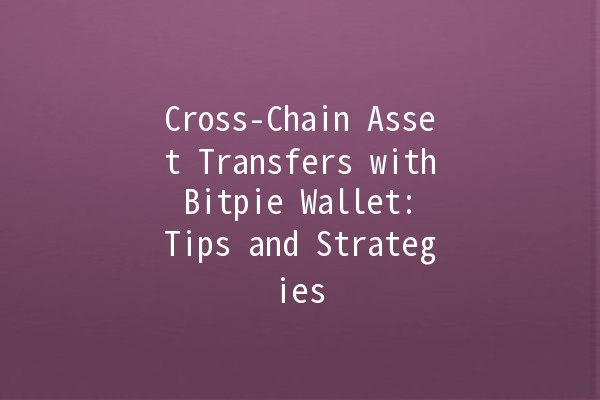
Bitpie Wallet is becoming an increasingly popular choice for cryptocurrency enthusiasts looking for versatility and security in their digital asset management. One of the most exciting features it offers is crosschain asset transfers, which allow users to move tokens across different blockchain networks seamlessly. This article will delve into crosschain transfers using Bitpie Wallet and provide five valuable productivity tips to enhance your experience.
Understanding Bitpie Wallet and CrossChain Transfers
Bitpie Wallet is a multicurrency wallet that supports a variety of cryptocurrencies across different blockchains. Its userfriendly interface and advanced security features make it an excellent choice for both novice and experienced users. Crosschain asset transfers mean you can move assets from one blockchain to another without the need for an intermediary or a centralized exchange.
In this section, we’ll cover some fundamental concepts before diving into specific strategies for effective crosschain transfers.

The Importance of CrossChain Transfers
Crosschain transfers have opened up new possibilities in the world of cryptocurrency. Users can leverage the unique features and advantages of different blockchains, such as lower fees, faster transaction times, or specific smart contract capabilities. The ability to transfer assets across chains offers greater flexibility and potential profit.
However, to make the most out of crosschain transfers, you need to understand how to use your wallet correctly and ensure that you are taking the right precautions.
Productivity Tip 1: Wallet Setup and Asset Management 🛠️
Setting Up Bitpie Wallet
Before you can start transferring assets between chains, ensure your Bitpie Wallet is set up correctly. Here are the essential steps:
Managing Your Assets
Managing your assets effectively in Bitpie Wallet involves categorizing them and keeping track of their values. One effective way is to routinely check market prices and create a watchlist of your tokens. Use the wallet to keep an eye on your holdings and make timely decisions about crosschain transfers.
Productivity Tip 2: Familiarize Yourself with Blockchain Networks 🌉
Understanding Different Blockchains
Before you can efficiently execute crosschain transfers, it’s crucial to understand the blockchains you will be working with. Each blockchain has its unique features, transaction fees, and transfer times. Familiarize yourself with:
Ethereum: Known for its robust decentralized applications (dApps) and smart contracts.
Bitcoin: The first and most widely known cryptocurrency, perfect for holding value.
Binance Smart Chain: A platform that provides lower transaction fees and faster confirmations for token transfers.
Practical Application
When initiating a crosschain transfer, consider the target network’s fees and processing times. For example, if you want to move Ethereum tokens to a network with lower fees like Binance Smart Chain, assess the best time to make the transfer based on network congestion.
Productivity Tip 3: Leverage Decentralized Exchanges (DEXs) 🔄
Using DEXs for CrossChain Transactions
Decentralized exchanges allow you to facilitate crosschain trades securely without relying on a centralized authority. Bitpie Wallet supports transactions with multiple DEXs.
StepbyStep
Benefits
Using DEXs for crosschain transactions can often be cheaper and faster than traditional centralized exchanges. Additionally, you maintain full control over your private keys and funds.
Productivity Tip 4: Stay Informed about Network Upgrades and Changes 🔍
Monitoring Blockchain Developments
The cryptocurrency landscape is continuously evolving. Keeping abreast of updates, hard forks, or partnerships can significantly impact your asset transfers.
Tips for Staying Updated
Follow Official Channels: Subscribe to newsletters, follow relevant Twitter accounts, and join forums or Telegram groups focusing on the blockchains you interest.
Utilize News Aggregators: Platforms like CoinDesk and CoinTelegraph provide comprehensive coverage of cryptocurrency developments. Regularly check these to stay informed.
Application
If a particular blockchain you use is undergoing an upgrade, it may affect transaction fees or speed. Being proactive about these changes can help you optimize your asset transfer strategy effectively.
Productivity Tip 5: Practice Safe Transactions 🔒
Security Measures for CrossChain Transfers
Security should always be a top priority when dealing with cryptocurrencies, especially during crosschain transfers. Here are practical security measures to adopt:
RealLife Example
In January 2023, a notable incident involved a user mistakenly sending tokens to the wrong address during a crosschain transfer. Due to the irreversible nature of blockchain transactions, this user lost their assets permanently. By adhering to security practices, you can mitigate similar risks.
Common Questions Regarding Bitpie Wallet and CrossChain Transfers ❓
Bitpie Wallet integrates with various blockchain networks, allowing users to execute crosschain transfers directly within the app. This feature streamlines the process and allows users to efficiently manage multiple assets.
Fees can vary depending on the blockchain you are using for the transfer. Bitpie Wallet typically displays the associated transaction fees before you confirm any transfer, allowing you to choose the most costeffective option.
Once a transaction is confirmed on the blockchain, it is irreversible. Therefore, it is crucial to doublecheck the recipient's address and ensure you are transferring to a compatible wallet. There are no recovery options for lost assets.
The time it takes for a crosschain transfer can depend on several factors, including network congestion and the specific blockchains involved. Generally, transactions can range from a few minutes to several hours.
Yes, Bitpie Wallet has a mobile application available for both iOS and Android. The app is designed for easy navigation, allowing you to manage your assets and perform crosschain transfers on the go.
If a transaction fails, you will usually receive an error message specifying the reason. Common reasons may include network issues or insufficient fees. Retry the transaction after resolving the underlying issue.
By staying informed and applying the tips outlined in this article, you'll enhance your experience with Bitpie Wallet and be prepared to leverage the benefits of crosschain asset transfers effectively. Happy trading! 🌟

